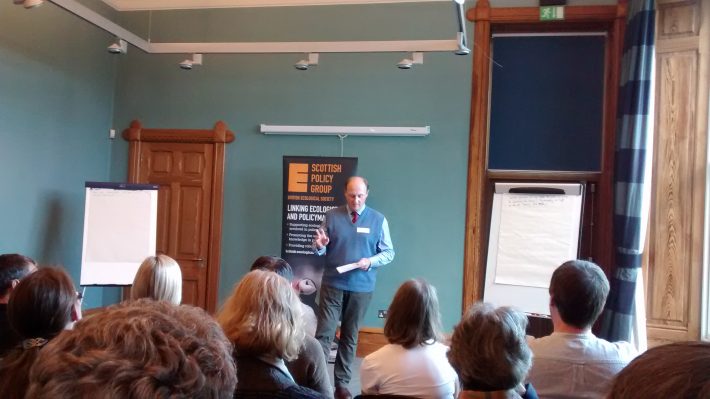The Scottish Policy Group discuss rewilding at the latest pie and a pint event
October’s “Pie and a Pint” event saw a northerly shift from its usual location of Edinburgh to Inverness, where members of the BES Scottish Policy Group gathered to discuss one of the most exciting yet controversial issues in contemporary ecology: rewilding.

In keeping with the usual format, three speakers presented their own perspectives on rewilding- Adam Smith of the Game and Wildlife Conservation Trust, Rob Brooker on behalf of Fenning Welstead of Alladale Estate and David Balharry of Rewilding Britain- to an audience of scientists, policy-makers, land managers and NGOs. After the presentations, and some liquid refreshment from the local Black Isle brewery, delegates were more than ready to join the debate.
How should rewilded land be managed?
The concept of rewilding cuts to the heart of questions around how land is managed, and for whom. But what should rewilding actually involve? Does it require active intervention, or should natural processes be allowed to shape our landscapes and biodiversity? The re-introduction of predators such as wolves and lynx, the range expansion of “ecosystem engineer” species like beavers and wild boar, the reduction or removal of sheep grazing and the restoration of large areas of forest are all on the table as mechanisms for promoting “natural” ecosystems over anthropogenic. Rewilding, in contrast to many current conservation programmes that focus on saving and restoring species and habitats, is essentially a different approach to conservation, where there is no fixed end-point to be achieved. Indeed, this has to be the case; unlike many countries, Scotland has no true wilderness, untouched by human influence, which can be used as an example, and past landscapes cannot be recreated after centuries of cultivation and climate change.
We need to trial rewilding projects
Another key theme to emerge is that successful rewilding attempts will need to take place on a large scale, in both time and space, and be supported by relevant policies and ongoing investment. However, this could be difficult to achieve in our current network of protected areas, many of which are on a relatively small scale. Conflicts between private and public interests, between nature and people, initially seem to be inevitable. Or are they? Despite the challenges, there was a general feeling that rewilding could bring opportunities for communities- both local and non-local, and a wide diversity of interest groups. As the reform of agricultural policies and subsidies is on the agenda for the coming years, society is likely to become increasingly engaged with the issues around rewilding. The question is, do we have the collective will and vision to allow wilderness, in whatever form it may take, to come into existence? Perhaps we need to start by exploring the environmental and social benefits a rewilded landscape could provide to individuals, communities and wider society, at a time when technology and twenty-first century living increasingly set us apart from our own “wild” origins.
Outcomes from group discussions have been written up by the SPG see – the place of people in rewilding.
Do you have any comments and recommendations you would like to feed into the rewilding debate?
Interested in the next PAAP? Become a member of the SPG and follow @BES_ScotPol on Twitter – see you there!
Like what we stand for?
Support our mission and help develop the next generation of ecologists by donating to the British Ecological Society.